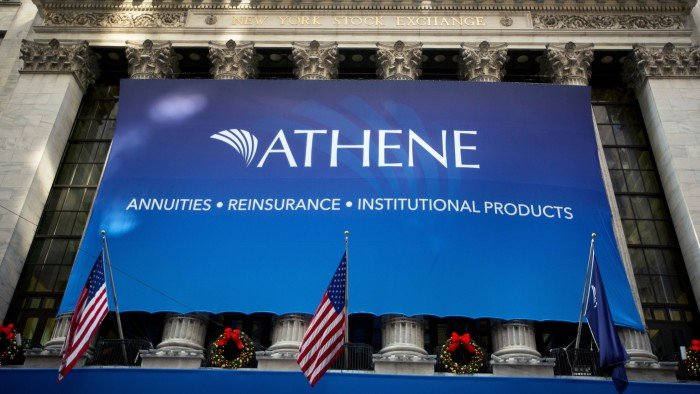Unlock the Editor’s Digest for free
Roula Khalaf, Editor of the FT, selects her favourite stories in this weekly newsletter.
Apollo has hit back against criticism of the close ties between its asset management arm and in-house insurer in an investor filing that instead points the finger at its chief rivals.
A presentation published by Apollo’s in-house insurer Athene last week zeroed in on life insurers owned by or affiliated with KKR, Blackstone and Brookfield, which Athene identified as having a larger proportion of related-party investments than it did.
The presentation showed 12 per cent of Athene’s assets were “related party” ones. That compared with 22 per cent for KKR’s Global Atlantic, 30 per cent for Brookfield’s American National Insurance, 35 per cent for Blackstone’s Everlake and 43 per cent for Security Benefit Life, the insurer owned by the holding company of billionaire sports investor Todd Boehly.
The column chart comparing Athene to its peers did not show figures for Blackstone’s larger affiliated insurers, Corebridge and Resolution Life, both of which had lower affiliated assets than Athene according to a Financial Times analysis of data compiled by S&P Global.
While Athene used year-end 2024 statutory filings to calculate its rivals’ proportion of related-party assets and rank them from highest to lowest, it used different data to calculate its own position.

If the same basis of calculation was used for Apollo’s Athene as its peers, its share of related-party assets jumped by about half, to 18 per cent.
Athene’s filing came a day after the conclusion of the summer meeting of the National Association of Insurance Commissioners (NAIC), which coordinates state insurance regulators.
Ties between asset managers and insurers have come under increasing scrutiny from state insurance regulators as private equity groups have piled into the sector.
Regulators have sought to understand whether life insurers are being saddled with related-party loans, with an insurer and its policyholders improperly used to subsidise their private equity owners’ portfolio companies.
Affiliated investments can carry higher risk charges, forcing insurers to hold more capital against them. Avoiding the designation can give firms a capital advantage.
Private equity groups with insurance arms have argued too many loans made at arms-length are improperly classified under NAIC rules as “affiliated”.
A key area of disagreement concerns the treatment of securitisations, bundles of many individual corporate loans or other cash-generating assets. Insurance affiliates’ securitisations of investment-grade debt — such as loans to large public companies, or student debt — can lead to apparently high allocations to affiliates.
KKR said that since 2022, expanded statutory disclosures included investments as affiliated “even though the credit risk of the asset itself may not be related in any way to Global Atlantic or KKR”.
KKR added: “While the number of ‘affiliated assets’ for Global Atlantic has significantly increased under the expanded disclosures, our approach to diversification and risk management remains consistent.”
People familiar with the positions of some of the groups Athene identified in its presentation challenged the data used. If the companies had been allowed to exclude securitisations of assets that were otherwise unaffiliated, the proportion of related-party assets involved would have appeared substantially lower, they said.
For its own position, Athene used adjusted figures which it said “look through to the underlying assets” and “fully [encompass] invested assets in all Athene entities across all jurisdictions”.
It used a US statutory view for other insurers because most of them did not make standalone filings with the Securities and Exchange Commission for their insurance operating entities, Athene added. It also used more recent data for itself.
S&P Global data show Athene’s affiliated assets nearly doubled from $22.6bn at the end of 2023 to $40.1bn at the end of 2024. About 30 per cent of the industry-wide growth in affiliated assets over that period came from Athene, according to the data.
Athene, which is headquartered in Iowa, and Global Atlantic, which owns an insurer there, have won more permissive capital treatment from the state insurance regulator on some assets that would typically have been tagged as affiliated by other states, people familiar with those decisions said.
The people said that had proved controversial, with insurance regulators from other states including New York and Virginia questioning Iowa’s treatment of the assets at last week’s NAIC meetings.
The Iowa Department of Insurance said the Iowa Insurance Division had not granted any exceptions or exemptions for affiliated assets, including as to how these must be disclosed or their capital treatment. It added the IID had, through its role on an NAIC working group, recommended increased disclosure by insurers about their affiliated assets.
It said it had no knowledge of concerns raised by other regulators and added the IID does not allow insurers to diverge from regulatory, accounting or capital rules on the treatment of assets.
Another Iowa-regulated insurer was recently approached by state regulators with a request to comment publicly on an area of regulatory controversy, according to people familiar with the discussions, but had declined.
The Iowa Department of Insurance said it was “not aware of any such request”, adding: “If such a request was made, it did not come from the Iowa Insurance Division.”
Athene, Blackstone and Brookfield declined to comment. Security Benefit did not respond to requests for comment. The NAIC did not immediately respond to a request for comment.
